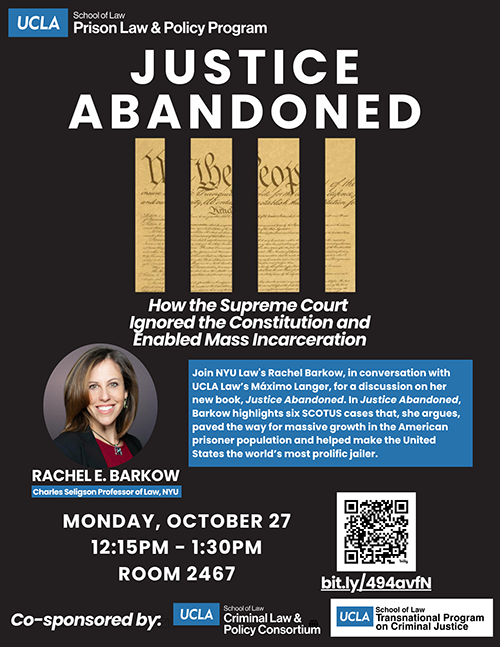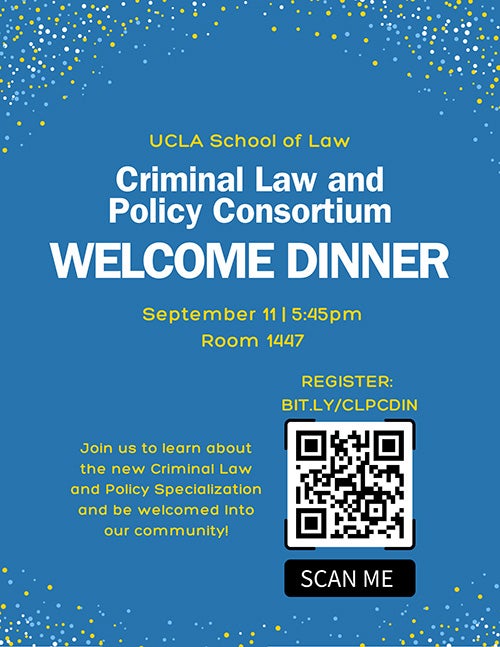Moving Justice Forward
Explore the impacts of the criminal legal system on individuals, communities, and American society.
Ranked one of the top criminal law programs in the country, UCLA Law offers students advanced study in a wide range of courses, culminating in a Criminal Law and Policy Specialization. The Criminal Law and Policy Consortium (CLPC) amplifies the work of the faculty, provides curricular guidance for students, fosters intellectual exchange on criminal legal issues, and supports impactful programming in criminal law. Students benefit from diverse opportunities to engage in independent research projects, support faculty research, and participate in criminal law clinics and externships in Los Angeles and beyond. CLPC is made possible by the generous support of The Rosalinde and Arthur Gilbert Foundation.
Learn About the Criminal Law and Policy specialization
The Criminal Law and Policy Consortium invites all students to an information session about UCLA Law’s new Criminal Law and Policy specialization on Monday, February 23rd at 12:15 PM in Room 1420.
The specialization offers a rigorous curriculum that blends substantive coursework with hands-on experience, preparing students to make an impact in advocacy, academia, policy, litigation, and beyond.
At the session, you’ll:
- learn about enrollment steps and requirements
- discover the benefits of earning the Specialization designation on your transcript
- explore the wide range of criminal law and policy courses taught by nationally recognized faculty, addressing issues such as due process, fairness, equality, state power, the rights of incarcerated individuals, judicial reform, policing tactics, justice-impacted youth, immigration consequences, and bail reform.
Don’t miss this opportunity to shape your academic path in one of the country’s top criminal law programs!
Who We Are
-
Core Faculty and Staff
Sharon Dolovich
Professor of Law
Faculty Director, UCLA Prison Law & Policy Program
Director, UCLA Law Behind Bars Data Project
Faculty Co-Director, Criminal Law & Policy ConsortiumIngrid Eagly
Professor of Law
Faculty Co-Director, Criminal Law & Policy ConsortiumTim McNutt
Manager, Criminal Law & Policy Consortium -
Affiliated Faculty
Shirin Bakhshay
Assistant Professor of LawStuart Banner
Norman Abrams Distinguished Professor of LawTimothy Casey
Professor from Practice
Director of Curricular AdministrationBeth A. Colgan
Professor of LawGerloni Cotton
Lecturer in LawKimberlé W. Crenshaw
Distinguished Professor of Law
Promise Institute Chair in Human RightsFanna Gamal
Assistant Professor of LawMark Greenberg
Michael H. Schill Endowed Chair in Law and Professor of PhilosophyMáximo Langer
David G. Price and Dallas P. Price Professor of Law
Director of the UCLA Transnational Program on Criminal JusticeAaron Littman
Assistant Professor of LawSunita Patel
Professor of Law
Faculty Director, Faculty Director of the David J. Epstein Program in Public Interest Law & Policy
Faculty Director, UCLA Veterans Legal ClinicJoanna C. Schwartz
Honorable Harry Pregerson Professor of LawSherod Thaxton
Professor of Law
Professor of African American Studies (by courtesy)
Professor of Public Policy (by courtesy)
Professor of Sociology (by courtesy)Pavel Wonsowicz
Lecturer in Law
Director, Academic Support Program - Emeritus Faculty
CLPC Affiliated Programs and Partners
- Affiliated Programs/Projects
-
Affiliated Student Organizations
Alliance of Formerly Incarcerated and System-Involved Students
The Alliance of Formerly Incarcerated and System-Involved Students (AFISIS) works to expand access to law school and the legal profession for individuals directly impacted by the criminal legal system. Composed of formerly incarcerated and system-involved students alongside committed allies, AFISIS advocates to dismantle structural barriers facing law school applicants and students with criminal records. Through mentorship, advocacy, and education, the group supports students navigating the law school application process, including character and fitness requirements, while fostering a more inclusive and equitable legal community. AFISIS is an initiative of the Prison Law and Policy Program.
Criminal Justice Law Review
The Criminal Justice Law Review (CJLR) publishes cutting-edge scholarship on issues related to criminal law, policy, and practice. CJLR serves as a forum for academics, practitioners, and students to explore reform-minded perspectives on policing, punishment, and criminal legal system accountability. In addition to producing volume of articles and essays each year, CJLR hosts events and symposia that foster dialogue and innovation in criminal legal reform.
El Centro Legal Reentry Clinic
El Centro Legal Reentry Clinic provides legal assistance to individuals impacted by the criminal legal system who are seeking a fresh start. Student volunteers, supervised by attorneys from A New Way of Life Reentry Project, help clients navigate the process of clearing criminal records, addressing barriers to employment, housing, and education, and rebuilding their lives after incarceration. Through direct service, students gain hands-on experience in post-conviction advocacy and a deeper understanding of the challenges faced by people reentering society.
El Centro Legal Veterans Project
El Centro Legal Veterans Project supports veterans in the Los Angeles area by offering legal assistance under the supervision of experienced attorneys and advocates from LAFLA’s Veterans Justice Center. UCLA Law students assist with general intakes and assist veterans in clearing their criminal records, removing barriers to employment, and securing housing. The project gives students valuable exposure to veterans’ law while fostering a commitment to service and social justice.
Incarcerated Persons Correspondence Project
The Incarcerated Persons Correspondence Project (IPCP) supports individuals in jails and prisons who seek information and assistance related to their criminal cases and conditions of confinement. Student volunteers respond to correspondence from incarcerated people by providing educational materials and referrals to relevant resources, while adhering to ethical limits on legal advice. Through this work, students develop written advocacy and client communication skills while contributing to increased access to information for an underserved and often isolated population. IPCP is an initiative of the Prison Law and Policy Program.
Law Students for Decarceration
Law Students for Decarceration (LSFD) is dedicated to challenging mass incarceration and advancing transformative justice. LSFD creates opportunities for advocacy, education, and direct engagement with affected communities through events, campaigns, and partnerships with local organizations. The group empowers students to think critically about the criminal legal system and to take action to build more equitable and restorative approaches.
-
Career Resources
Students interested in criminal law careers should consult the following job guides as well as take advantage of the career counseling available through the Office of Public Interest Counseling and Office of Career Services.
-
Research for Change
With generous funding from The Rosalinde and Arthur Gilbert Foundation, the Research for Change Initiative harnesses the power of University-based research to inform real-world criminal legal topics.
-
Past Events
 Rachel Barkow Book Talk
Rachel Barkow Book Talk📅 Monday, October 27, 2025
🕔 12:15 PM – 1:30 PM
📍 Room 2467The Prison Law and Policy Program hosted a book talk with NYU School of Law Professor Rachel Barkow. Professor Barkow discussed her new book, Justice Abandoned: How the Supreme Court Ignored the Constitution and Enabled Mass Incarceration with UCLA Law’s Máximo Langer. In Justice Abandoned, Barkow highlights six SCOTUS cases that, she argues, paved the way for massive growth in the American prisoner population and helped make the United States the world’s most prolific jailer.
This event was cosponsored by the UCLA Transnational Program on Criminal Justice and supported by the UCLA Criminal Law and Policy Consortium.
 Welcome Dinner
Welcome Dinner
We’re excited to invite you to the Criminal Law & Policy Consortium Welcome Dinner!📅 Thursday, September 11, 2025
🕔 5:45 PM – 7:45 PM
📍 Room 1447 & Shapiro CourtyardCome share food, connect with peers and faculty, and be welcomed into UCLA’s criminal law and prison law community. Please RSVP as soon as possible using the form bit.ly/clpcdin so we can plan for dinner. *Note that the event will commence at Room 1447, where you will hear all about the Consortium, the new CLP Specialization and the many opportunities for UCLA students in this space. We will then move to the Shapiro Courtyard for dinner.
-
Contact Us